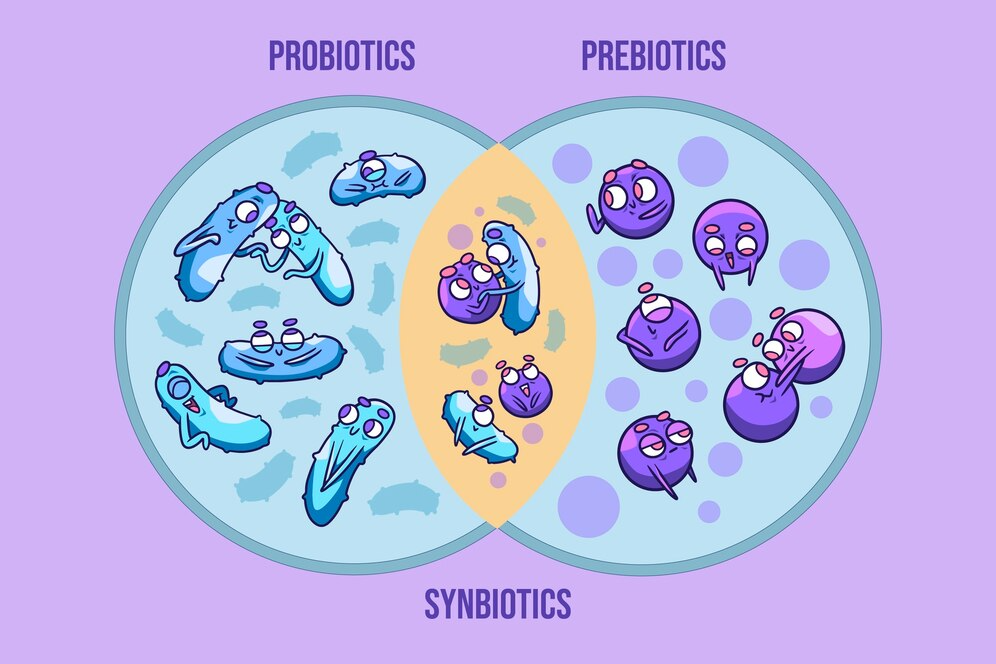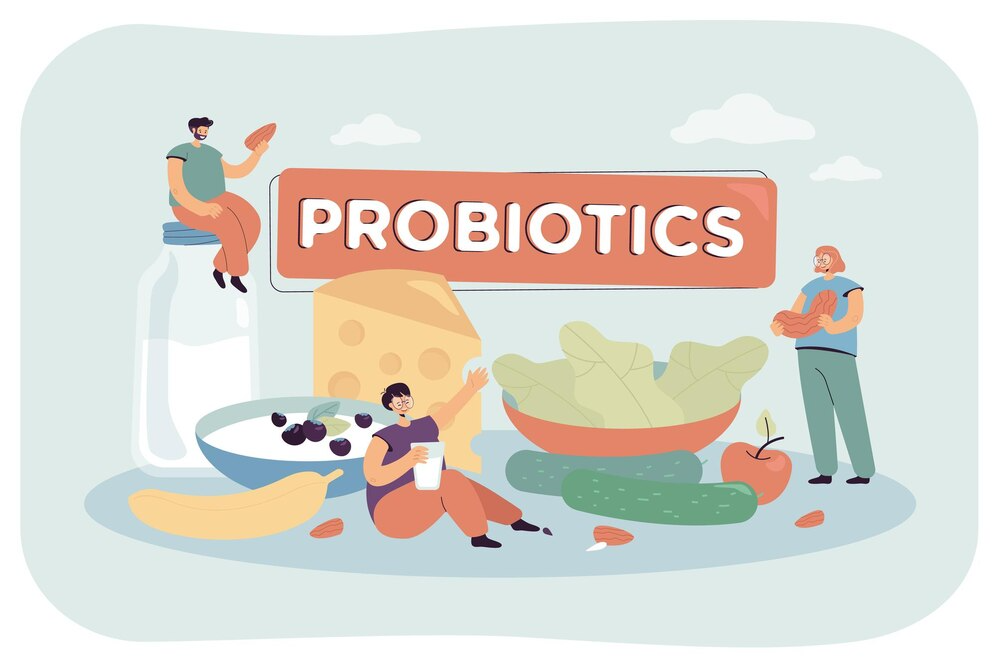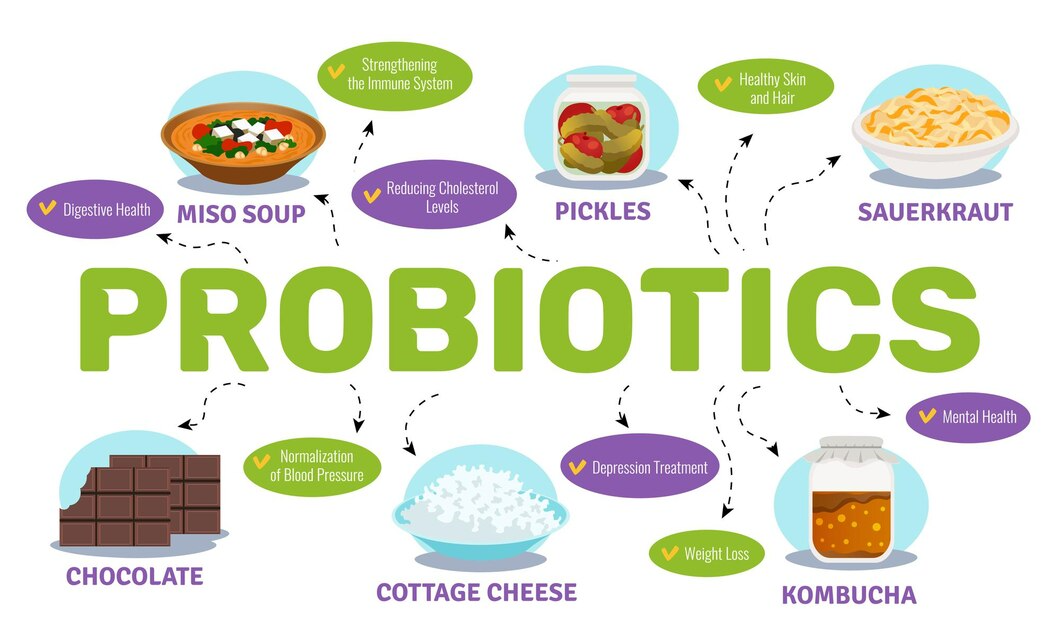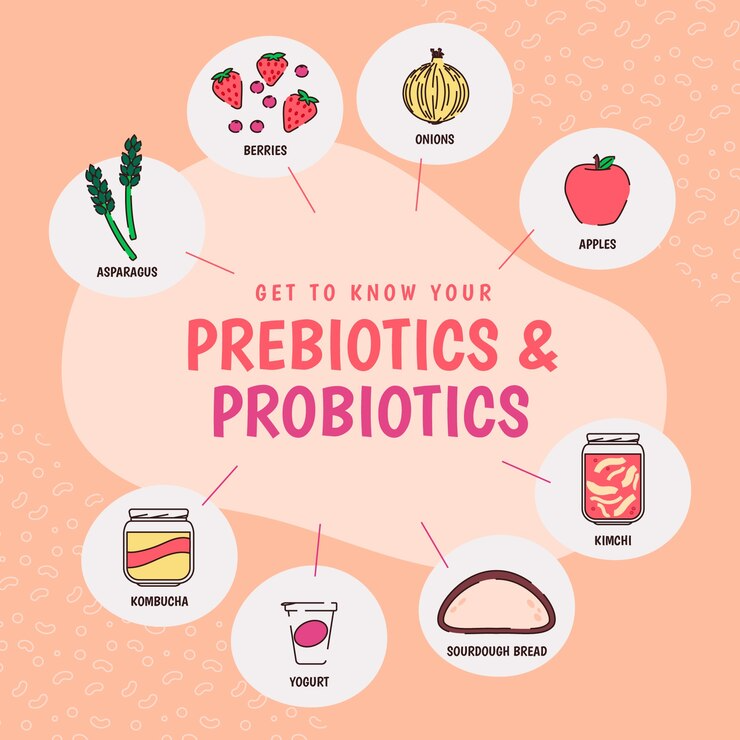How Are Probiotics And Prebiotics Different?
You might have come across the terms – Probiotics And Prebiotics on social media as they are mentioned by many celebrities, nutritionists, doctors, health-fitness-oriented people, and mothers.
Table of Contents
Now, many of you might have been wondering what it would be or what these do. Are these of any help for our body or just a gimmick, a marketing strategy for this industry to make money? Keep on reading to get all the answers in this article.
What are prebiotics?
Prebiotics are compounds that come from types of carbohydrates, which are mostly fibre, that humans consume through high-fibre foods.
We need to digest this fibre that comes from food like fruits, vegetables, beans, and whole grains. The good bacteria that are present in your gut eat this fibre.
Prebiotics are mainly found in plant foods like bananas, onion, garlic, leeks, asparagus, artichokes, tomatoes, plums, apples, nuts, soybeans, and whole-wheat foods.
What are the benefits of prebiotics?
- These serve as food for probiotics.
- They impede the bloodstream’s ability to absorb sugar.
- This helps in balancing the blood sugar levels even throughout the day in ordinary healthy people.
- These keep the blood cholesterol levels within a normal range.
- When the fibres are broken down, they produce compounds that promote gut health, immunity, and skin and hair health.
- This increases calcium absorption.
- This also gives relief from some digestive issues.

What are probiotics?
Probiotics are live bacteria found in the gut and certain foods or supplements. These bacteria help in fighting the less friendly ones and boost our immunity against infections.
The word ‘probiotic’ is derived from the Latin preposition ‘pro’ and the Greek word ‘biotic’. ‘Pro’ means “for”, and ‘biotic’ means “bios”, i.e., ‘life’. So, a probiotic is for life to promote life, and exactly does that in our digestive tract?
Even though they are present already in the gut, we can still consume them through food and supplements, which will help in balancing the populations of the various types of bacteria in our gut. This promotes gut health and numerous health benefits.
The most common source of probiotics is fermented dairy products like yogurt, buttermilk, and certain aged cheeses. The most common strain of probiotic bacteria that stays in our intestines is Lactobacillus acidophilus, and this is found in yogurt. That is why it is recommended to eat yogurt every day to avoid gut issues. Some good probiotic sources other than yogurt are –
- Kimchi
- Gochujang
- Sauerkraut
- Miso
- Pickles
- Nato
- Kefir
- Gouda
- Parmesan cheese
- Cheddar cheese
- Olives

What are the benefits of probiotics
- Probiotics restore the balance of gut bacteria.
- These keep your immune system strong.
- These promote normalcy and regularity.
- Reduce blood cholesterol levels.
- Probiotics may play a crucial role in cancer prevention.
- Regulates blood pressure.
- With probiotics, positive effects on mood are observed.
- Probiotics support the gut microbiome.
Common Symptoms of Gut Issues
Gut health is of great importance as it helps in determining your overall health. Numerous illnesses, including autoimmune diseases, cancer, gastrointestinal disorders like irritable bowel syndrome, endocrine disorders like type 2 diabetes, mental health issues, cardiovascular diseases, and many more can be brought on by an unhealthy gut. This means identifying the signs and symptoms of poor gut health is extremely important. Some of the symptoms would be:
1. Stomach Disturbances:
Many of you might have faced issues like gas, bloating, nausea, abdominal pain, diarrhea, constipation, back pain, shoulder pain, and heartburn. If you have an unhealthy gut, you will face these symptoms too frequently. This means indigestion and, thus, improper excretion.
2. Skin Health:
Breaking out of pimples, acne, rashes, or bumps on the skin is often seen. Can you believe that the harmful bacteria in the gut can be a cause of these? Yes, it is true. Due to an unhealthy gut, you might experience severe skin conditions.
3. Changes in Weight:
An unhealthy gut can affect your body in many ways. It diminishes the ability to function correctly. This leads to abnormal changes in body weight, be it gaining or losing it without any process. It hampers the metabolic rate.
4. Food Intolerances:
When you are unable to digest some food or find difficulty digesting them, that means you have food intolerances. Due to the gut’s poor bacterial quality, this could develop. If you are facing diarrhea, bloating, gas, nausea, and abdominal pain, this could mean your gut is not working correctly.
5. Sleep Disturbances & Exhaustion:
Do you suffer from disturbed sleep habits? Are you always tired? Do you still have fatigue in the morning after waking up? All these could lead to an unhealthy gut. It is very commonly found too. All of this is tied to inflammation, metabolic functions, and mental health.
6. Autoimmune Conditions:
An unhealthy gut usually keeps on amplifying the inflammation, disrupting the proper functioning of the immune system. This often leads to the body attacking itself mistakenly and thus paves the way for autoimmune disorders.
7. Inflammation & its Frequency:
In our fast life and excessive consumption of junk processed food and sugars, the number of good bacteria diminishes. The result is an increase in intestinal inflammation. This affects your immune system, which leads to multiple occurrences of infections for a prolonged period.
8. Bad Breath
:Bad breath usually happens due to the cause of some gut issues. It is a direct indication that your gut is not functioning correctly. It is a symptom of GERD, gastroesophageal reflux disease.
The Importance of Probiotics in Improving Gut Health
Probiotics help stimulate the growth of good bacteria. They also protect against disease-causing bacteria. When too many “bad” bacteria are found in the gut, probiotics fight them off to rebalance the gut. Some of the reasons showing the importance of probiotics in improving the gut health are:
- They optimize the gut function as they balance the bacteria in your digestive system.
- Due to inflammation, you might consume antibiotics, which then kill many of your good bacteria, letting the harmful bacteria rule. If you consume probiotics, then it will help in restoring the balance.
- They proactively reduce some of the digestive disorders. Probiotics reduce the severity of diseases like IBS, Irritable Bowel Syndrome.
- Antibiotics often cause diarrhea. Taking probiotics reduces the frequency of diarrhea. It also reduces gas and bloating.
- Usage of probiotics can reduce the severity of leaky gut syndrome, which is increased intestinal permeability caused by the damage of the gut barrier.
- Stress is known to disturb gut bacteria, which may affect the quantity and function of neurotransmitters. Probiotic supplements can help maintain the balance of good bacteria and improve mood, sleep, and cognitive function. It controls anxiety and depression.
- Probiotics boost the immune system and speed up the recovery of the body from illness.
- It protects against cold, flu, and antibiotic resistance and reduces the severity of specific allergies and eczema.
When should you take prebiotics?

Even if you know what prebiotics is, you might wonder when to start on it. Well, it is usually taken when you find bowel irregularity for a prolonged time.
Constipation is often a sign that you need to consume more fibre. In case you have arthritis and even cardiovascular disease, you should include prebiotics in your diet.
Be mindful of the consumption of prebiotics. It is best to increase the amount of fibre gradually and consume more fluids and water to let your body adjust.
You can take prebiotic supplements either in the morning on an empty stomach or in the night before bed, but remember to be consistent about it.
FAQ
1. Which is better for you: probiotic or prebiotic?
It isn’t easy to state, but I will still try to conclude. Probiotics boost your gut’s health and ensure a smooth bowel movement.
Prebiotics nourish probiotics in the gut, facilitating the formation of healthy colonies of good bacteria. Being dietary fibre, they help in the smooth movement of food in your digestive tract.
Many experts suggest taking both as probiotics fill up the good bacteria in the gut, whereas the prebiotics act as food for these good bacteria. So, taking them both would be beneficial for healthy gut health.
2. Who should not take prebiotics?
Prebiotics are only sometimes appropriate for everyone and thus not recommended to just everyone all the time.
It can worsen symptoms of irritable bowel syndrome because rapid fermentation can cause gas, bloating, nausea, diarrhea, or constipation in patients who are more sensitive to it.
If you have Small Intestinal Bacterial Overgrowth (SIBO) or FODMAPs intolerance, prebiotics are also not recommended.
3. Do you need both prebiotics and probiotics?
Keeping your gut bacteria balanced is crucial for many aspects of health. Eat plenty of both prebiotic and probiotic foods, as they will help promote the ideal balance between good and bad gut bacteria.
You can take supplements, too, but for that, talk to your doctor to make sure you’re eating the right amounts of each.
Conclusion
A variety of gut bacteria of good functioning quality are essential for gut health. You can choose to add a variety of prebiotic and probiotic foods to your diet, which can help keep your gut balanced and at its ideal functioning.
But always keep in mind to consult your doctor before including supplements in your diet, as nothing in excessive quantity is good for your health.
